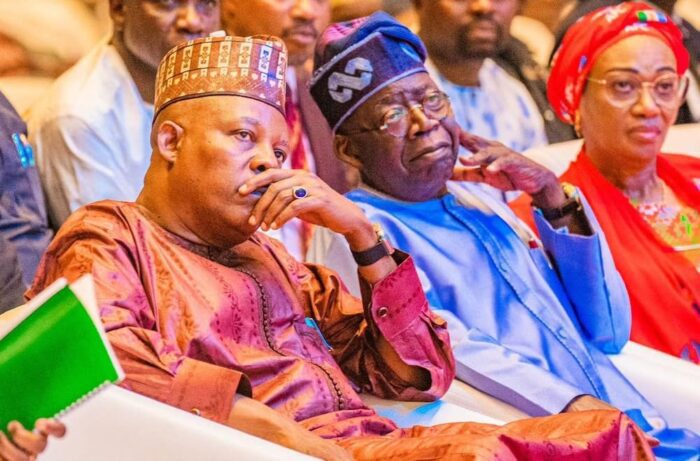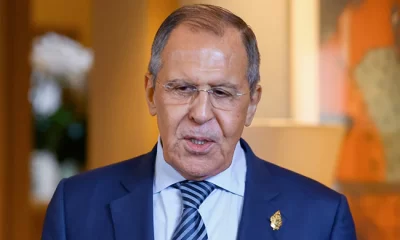Political Issues
A Psychological and Legal Confrontation Inside Aso Rock: Shettima Calls Tinubu Out, Fubara Must Be Restored Now -By Psychologist John Egbeazien Oshodi
This type of directedness—bold, internal, and principled—is the first of its kind, not even seen in American political life. In the United States, while Vice President Michael Richard Pence resisted pressure from President Donald John Trump to block the 2020 Electoral College certification, his resistance was procedural, limited to a single moment, and occurred at the end of his term. It lacked the sweeping philosophical and moral confrontation that Shettima has now brought forward.

“I Was Once the Target—Now I’m the Warning”: Vice President Kashim Shettima’s Unprecedented Psychological Blow to President Bola Ahmed Tinubu
In the grand theatre of political power, rare are the moments when a sitting Vice President uses the weight of his personal trauma and the stage of public ceremony to issue a direct, philosophical, and constitutional challenge to the very President he serves under. Yet this is precisely what unfolded when Vice President Kashim Shettima delivered a carefully crafted, emotionally charged, and intellectually precise speech at the launch of Mohammed Bello Adoke’s book, OPL 245: Inside Story of the $1.3 Billion Nigeria Oil Block. While the occasion was ostensibly about history, Shettima made it unmistakably about the present—about Rivers State, about executive overreach, and about President Bola Ahmed Tinubu.

A Speech Turned into a Psychological Mirror
This was not just a political event. It was an emotional and psychological projection. Shettima, through a structured cascade of storytelling, philosophical commentary, and moral argument, spoke to a nation’s buried conscience. He reminded the political class that memory, once activated, becomes resistance; and that resistance, when spoken from within the system, is not treason but truth.
Unprecedented in Nigerian and American Politics
This type of directedness—bold, internal, and principled—is the first of its kind, not even seen in American political life. In the United States, while Vice President Michael Richard Pence resisted pressure from President Donald John Trump to block the 2020 Electoral College certification, his resistance was procedural, limited to a single moment, and occurred at the end of his term. It lacked the sweeping philosophical and moral confrontation that Shettima has now brought forward.
Similarly, Vice President Richard Bruce Cheney never publicly rebuked President George Walker Bush during their joint tenure, nor did Vice President Albert Arnold Gore Jr. challenge President William Jefferson Clinton on matters of governance or constitutional conduct. Even during moments of intense scandal or ideological divergence, American vice presidents have generally remained restrained, prioritizing internal loyalty over public accountability.
What Shettima has done is far more radical—he invoked his own trauma, reactivated the nation’s historical memory, and placed his own administration on public trial. It is an act of institutional dissent from within that stands almost alone in global democratic history. It is a Nigerian original—risky, courageous, and transformative. And yet, Nigeria practices a version of the American Constitution, although oddly and badly. What Shettima has done transcends imitation; it reclaims the true spirit of checks and balances. It turns constitutional democracy into lived defiance.
A Voice of Conscience, Not Allegiance
This moment, no matter how uncomfortable it may be to those in power, is good for Nigeria. As a psychologist and the writer of this piece, I must state clearly: I hold no personal relationship with Vice President Shettima or President Tinubu. My reflections are not rooted in allegiance but in psychological observation and civic duty. What Shettima did today is real. It is rare. And it is better for Nigeria’s democracy. It represents a moment of internal correction, the kind that constitutional democracies desperately need to survive. It signals that within even the highest levels of government, there remain voices willing to challenge the erosion of constitutional boundaries. In a country where sycophancy too often overshadows conscience, Shettima’s words serve as a psychological reset—a recalibration of how power should be spoken to. And if I may be honest, I thank him, indirectly, for this moment. For his courage. For his memory. And for showing the country that to dissent from within is not to betray, but to uphold something greater.
A Direct Rebuke to Legislative Complicity in the Rivers Crisis
He somehow also rebuked the Speaker of the House of Representatives and the Senate President—two powerful allies who walked in step with the Rivers State constitutional violation, particularly as it relates to the ongoing suppression of Governor Siminalayi Fubara. Without naming them directly, his invocation of the rule of law, of the danger of executive overreach, and of the eternal judgment of history, placed not only Tinubu but also these legislative leaders on moral trial. Their complicity in the undermining of Fubara’s elected mandate was exposed not through accusation but through contrast—Shettima’s emphasis on his own near-removal in Borno and the constitutional protection he received served as a mirror to their silence and active collusion. In the courtroom of national conscience Shettima invoked, those who aided illegality are not excused by silence. They, too, have now been named—by implication and by principle.
A Call for Tinubu to Act Immediately
And now, with the Vice President openly telling Nigerians about the illegality and abuse of power in the Rivers State situation—acts directly enabled by President Bola Tinubu—there is no longer a shield of plausible deniability. Tinubu has been placed on moral notice, not by opposition figures or external critics, but by his own second-in-command. With such a direct exposure laid bare before the public, Tinubu has no constitutional or ethical option left but to immediately instruct the full reinstatement and recognition of Governor Fubara. To delay would be to deepen the fracture, not just in Rivers politics but in the presidency itself. Shettima has drawn the line—and Tinubu must now decide whether to uphold justice or confirm complicity.
Conclusion: A Psychological Cold War Begins in Aso Rock
We don’t know how this will end. But what is clear is that it will be a full-blown ride—not just between Shettima and Tinubu, but right there within Aso Rock itself: between the Office of the Vice President and his team, and the President’s own circle. A psychological cold war may have begun within the nation’s highest walls—and its outcome will shape the nation’s conscience for years to come.
Professor John Egbeazien Oshodi is a U.S.-based psychologist, educator, and author with deep expertise in forensic, legal, and clinical psychology, cross-cultural psychology, and police and prison science. Born in Uromi, Edo State, Nigeria, and the son of a 37-year veteran of the Nigeria Police Force, his early immersion in law enforcement laid the foundation for a lifelong commitment to justice, institutional transformation, and psychological empowerment.
In 2011, he introduced state-of-the-art forensic psychology to Nigeria through the National Universities Commission and Nasarawa State University, where he served as Associate Professor of Psychology. Over the decades, he has taught at Florida Memorial University, Florida International University, Broward College (as Assistant Professor and Interim Associate Dean), Nova Southeastern University, and Lynn University. He currently teaches at Walden University and holds virtual academic roles with Weldios University and ISCOM University.
In the U.S., Prof. Oshodi serves as a government consultant in forensic-clinical psychology and leads professional and research initiatives through the Oshodi Foundation, the Center for Psychological and Forensic Services. He is the originator of Psychoafricalysis, a culturally anchored psychological model that integrates African sociocultural realities, historical memory, and symbolic-spiritual consciousness—offering a transformative alternative to dominant Western psychological paradigms.
A proud Black Republican, Professor Oshodi is a strong advocate for ethical leadership, institutional accountability, and renewed bonds between Africa and its global diaspora—working across borders to inspire psychological resilience, systemic reform, and forward-looking public dialogue.










